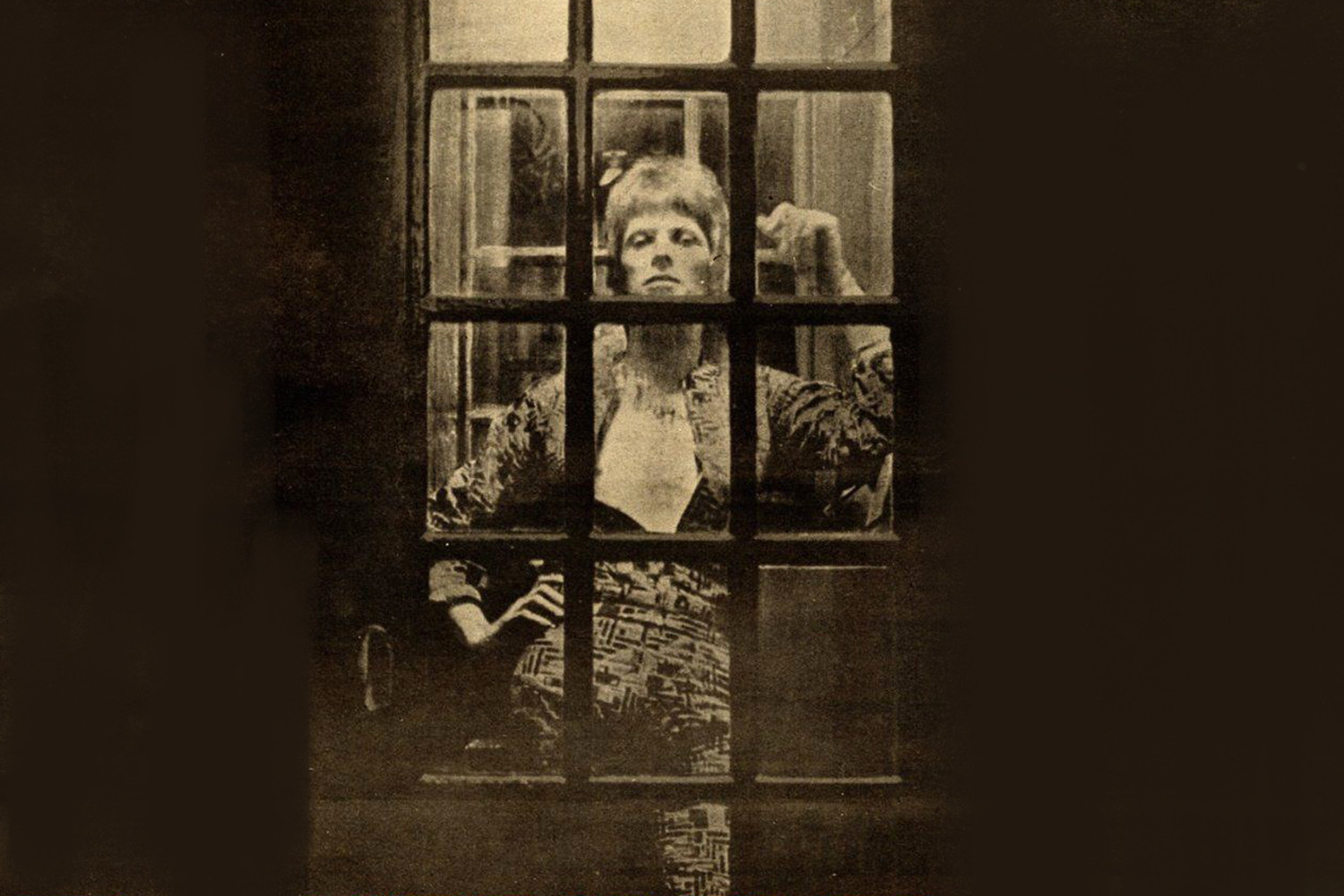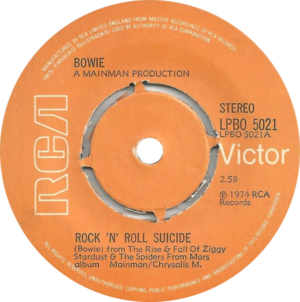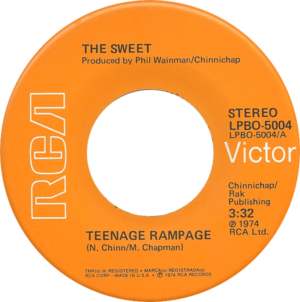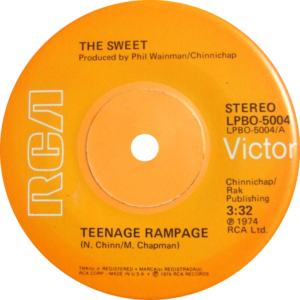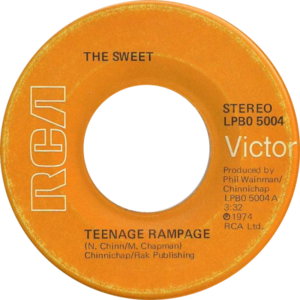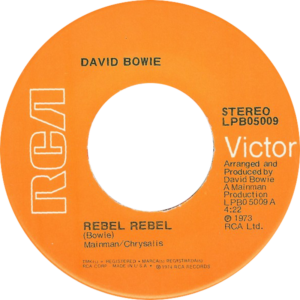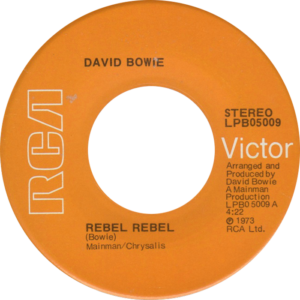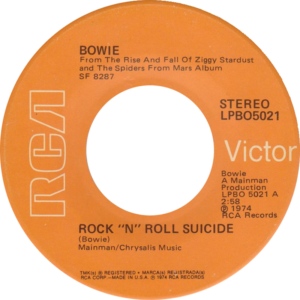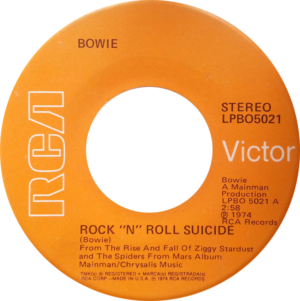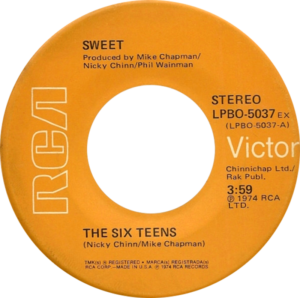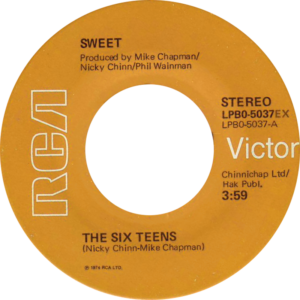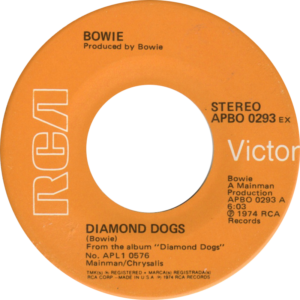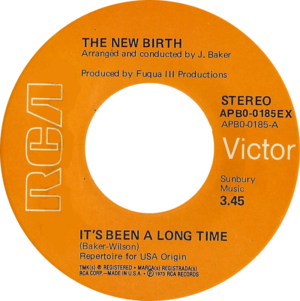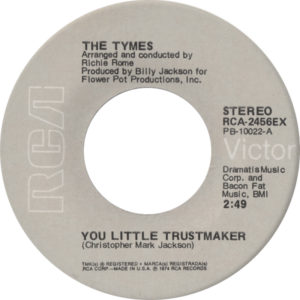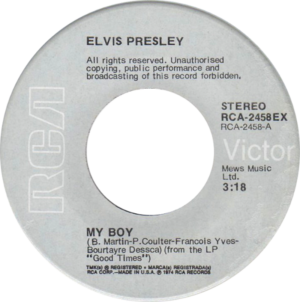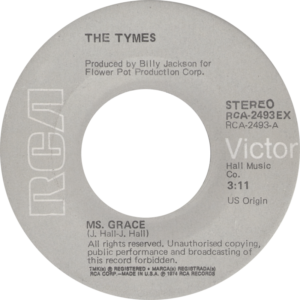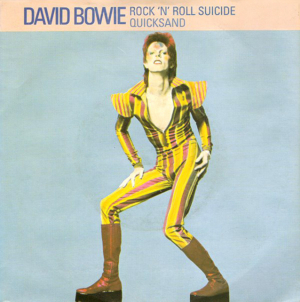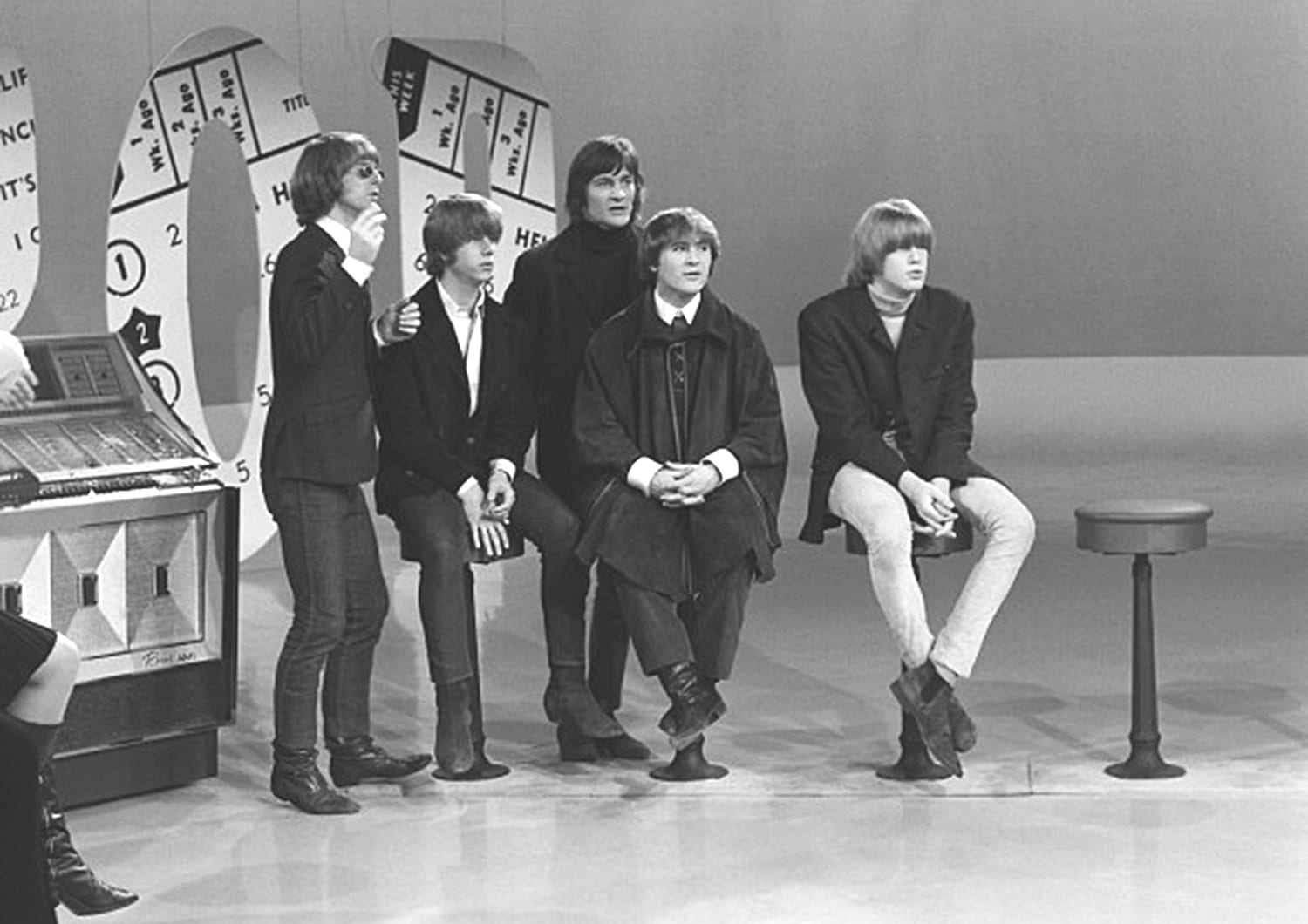Estimated reading time is 15 minutes.
THERE ARE A HANDFUL OF RECORDS from the ’70s that are so common among British collectors that they receive little attention from them. But they are all rather rare records outside of the UK—so rare, that most non-UK collectors have only seen them as images on the internet! Due to the general lack of information about these records, they aren’t valuable, despite several being from the highly collectible David Bowie!
In 1974, RCA in the US manufactured a few records exclusively to be exported to RCA in England for sale in the UK. Why this occurred remains a topic of discussion among record collectors. Two theories have received attention from collectors: a shortage of vinyl in the UK or a shortage of labor in the UK. Both of these plus two other possible causes are addressed below.
Researching export-only Elvis Presley records led to researching export-only David Bowie records.
This article was originally written to address the origins of just one record: RCA 2458EX, the US-manufactured 45 rpm single of Elvis Presley’s My Boy / Loving Arms. (In fact, it was written for my other blog, Elvis – A Touch Of Gold.) When I started looking at the other US-manufactured-for-UK-sales records issued at the same time as the Presley platter, I was compelled to address them separately.
So, this article looks at ten export-only records from 1974. As three of them were by David Bowie, I made him the focus of this article. As 1974 opened, David had seen his previous five singles reach the Top 10 in the UK, so he was RCA’s hottest new artist. To meet the demand for his next three singles, RCA in the UK had to reach out to RCA in the US for assistance.
RCA also had to import records by the New Birth, Lou Reed, the Sweet, and the Tymes. These records are addressed below.

To export David Bowie
While David Bowie is rightly ranked among the major figures in rock and pop music, his ascendancy was a difficult and lengthy affair. His first record was released in 1964 (Liza Jane) yet he didn’t have a hit until 1969 (Space Oddity) and then it took almost three years for his second hit (Starman). From 1969 through 1997, he placed two dozen sides in the British Top 10.
But during that same period, only half that number reached the Top 10 in the US. In fact, Bowie’s first hit in the US didn’t happen until 1973 when Space Oddity reached the Top 20 four years after its release! David finally started reaching a radio-friendly audience in 1973, after which he was a reasonably steady hitmaker.
By 1974, David Bowie was replacing Elvis Presley as the marquee figure for RCA Records & Tapes.
During the time of Bowie’s ascendancy, RCA’s biggest star was falling. Elvis Presley morphed from the passionately committed rock artist of 1969-1970 to an artist who seemed more interested in making inroads into the MOR and country markets than with the younger rock audience.
By the time that RCA needed to import records into the UK in 1974, David Bowie was replacing Elvis Presley as the marquee figure for RCA Records & Tapes worldwide.
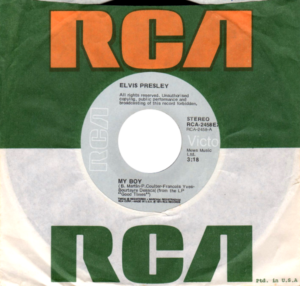
An oil shortage?
There was an “oil crisis” that began in October 1973 when members of the Organization of Arab Petroleum Exporting Countries (OAPEC) enacted an embargo on nations supporting Israel during the Arab-Israeli War. The Arab oil producers’ initial targets included Canada, Japan, the Netherlands, the United Kingdom, and the United States.
The embargo had an impact on everything that required oil for its creation in those countries, including the polyvinyl chloride needed to make records. Exactly how much the embargo affected record companies around the world is not known.
That is, this theory is reasonable but unproven as the cause of the need for British record companies to import records in 1974.
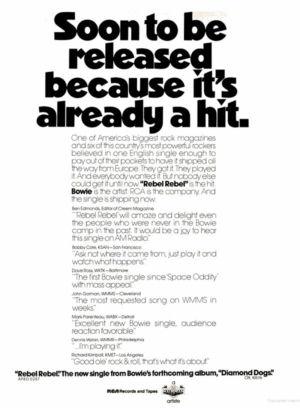
A labor shortage?
The second theory argues that the need for importing records was caused by a labor shortage. There was a coalminers’ dispute in the UK in 1973-1974 that did lead to a three-day work-week that might have affected the record industry. According to The Blackout Report:
“The start of 1974 saw much of UK industry operate under a three-day week restricting their electricity use. The period of electricity rationing lasted for more than two months and played a pivotal role in unseating the British government. The crisis came to a head thanks to an industrial dispute with coal miners in the midst of a global oil crisis.
The restrictions came into force on January 1, 1974, and lasted until March 7, 1974 Businesses had to limit their electricity use to just three specified consecutive days a week and were banned from operating for long hours on those dates. Services deemed essential were exempt from the action. These included hospitals and supermarkets, along with newspaper printing presses.”
This theory is also reasonable but also unproven as the source of the British record industry problems.
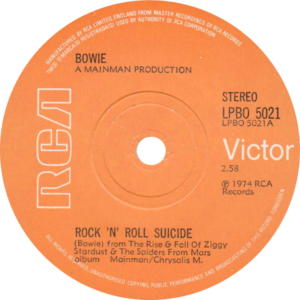
A third theory
There is a third theory that is rarely bantered about in the record collecting community. It is addressed in a pair of articles that appeared on the front page of the December 22, 1973, issue of Billboard. The first article is titled “Sales Surge & Crunch Hit Stock in UK” and stated:
“Soaring demand or product has plunged records companies into the worst pre-Christmas stock shortages in many years. Pressure on pressing plants, and raw material and board shortages, coupled with high consumer demand, has resulted in low completion rates in many categories of records and tapes.”
Executives from several record companies chimed in with observations, estimating that the industry’s sales were up as much as 30% compared to the same period just one year before! One general sales manager exclaimed, “Obviously the situation is critical, but nobody can do much about it.”
The second article is titled “LP Imports Advance Sharply in UK; Singles Declining” stated that the problems facing the various British record companies necessitated the pressing of an increasing amount of product abroad:
“Pressing problems in the UK seem unlikely to ease at least in the short term—the view of many in the industry is that there will be little investment in new plants while the vinyl shortage lasts.”
Like the first two theories, this one is reasonable yet unproven as the source of the British record industry problems.
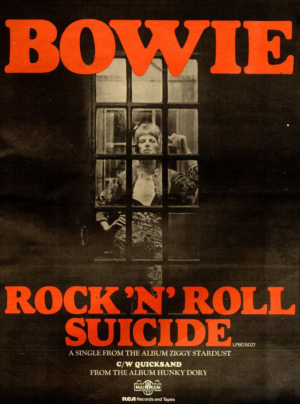
And yet another theory!
The three authors of the book Elvis UK - The Ultimate Guide to Elvis Presley’s British Record Releases 1956-1985 had a slightly different take on the situation:
“It has been suggested that the reason RCA imported [these records] was that RCA’s UK plant in Washington, Tyne and Wear was on strike at the time, or that it was because of the worldwide shortage of vinyl which forced companies to rationalise production. However, we have it on good authority that it was production problems [emphasis added] at Washington which mainly accounted for the fact that most copies available in the UK were pressed in America.”
The “production problems” are not defined. They could have been a lack of raw materials (the oil crisis theory), a lack of workers (the labor theory), the malfunctioning of manufacturing equipment, a health hazard, or something else. Needless to say, this theory is reasonable yet unproven as the cause of British record companies importing records in 1974.
Now, onto the actual records.
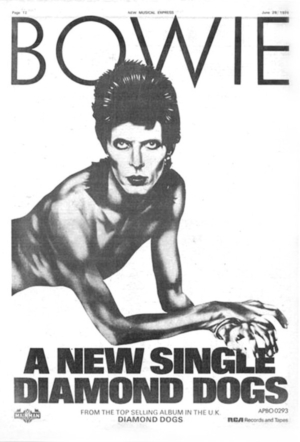
Conclusion?
So, which of the four theories works best as an explanation for RCA’s need to import these records in 1974? Well, all of them work to some degree:
• There was an oil shortage and that should have had some kind of impact on the record industry.
• There was a three-day work-week with a restriction on electricity that should have had some kind of impact on the record industry.
• There was an unexpected increase in demand for records that should have had some kind of impact on the record industry.
• There was an unexplained production problem at a pressing planet that should have had some kind of impact on the record industry.
Maybe it was a combination of two or more of these factors. Heck, it may have been something else entirely different from these four reasons! Alas, we may never know.
Now, onto the records . . .

The export records
The exact number of records manufactured in other countries for RCA in England is not known. I found ten titles that were pressed in the US for them but I also found export-only records manufactured for RCA from Canada, France, and Germany.
The best-known of these records is the US-manufactured 2458EX, Elvis Presley’s My Boy / Loving Arms. This special US-pressing exists alongside five different versions of this record pressed in England in 1974!
Among the export-only records from the US, I identified four in the LPB0-5000 series and three in the 2000 series—neither of which were used in the US—along with three in the APB0-0000 series. This latter series was RCA’s attempt to standardize their catalog numbering system globally, so UK and US pressings have the same numbers.
The LPB0 and APB0 series have four figures in their prefix—three letters followed by a number. For singles, that number is zero. Nonetheless, millions of RCA records were pressed with an incorrect prefix with an “O” instead of a zero (as APBO or LPBO).
I used Discogs and 45cat to find these ten records. If you are aware of others, please contact me via the Comments section below.
LPB0-5000 series
The Sweet
LPB0-5004, Teenage Rampage / Own Up, Take A Look At Yourself
Image 1, 2: Orange label. Catalog number printed with a dash and with an incorrect “O” as LPBO-5004. Includes trademark data with “Made in U.S.A.”
Image 3: Orange label. Catalog number printed with a space and with the correct zero as LPB0 5004. Trademark data missing.
Released: January 1974
Peak UK chart position: #2
This record was not released in the US.
David Bowie
LPB0-5009, Rebel Rebel / Queen Bitch
Image 1: Orange label. Catalog number printed without a space or a dash and with the correct zero as LPB05009. Includes trademark data with “Made in U.S.A.”
Image 2: Orange label. Catalog number printed without a space or a dash and with the correct zero as LPB05009. Trademark data missing.
Released: February 1974
Peak UK chart position: #5
This record was not released in the US. Rebel Rebel was released in the US in May 1974 as APB0-0287 with Lady Grinning Soul as the flip-side.
David Bowie
LPB0-5021, Rock ‘N’ Roll Suicide / Quicksand
Image 1: Orange label. Catalog number printed without a space or a dash and with an incorrect “O” as LPBO5021. Includes trademark data with “Made in U.S.A.” Album credit at top.
Image 2: Orange label. Catalog number printed without a space or a dash and with an incorrect “O” as LPBO5021. Includes trademark data with “Made in U.S.A.” Album credit at the bottom.
Released: April 1974
Peak UK chart position: #22
This record was not released in the US.
Note: Both records incorrectly use double quotation marks around the contraction for “and.”
The Sweet
LPB0-5037EX, The Six Teens / Burn On The Flame
Image 1: Orange label. Catalog number printed with a dash and with an incorrect “O” as LPBO-5037 with “EX” suffix. Includes trademark data with “Made in U.S.A.”
Image 2: Orange label. Catalog number printed with a dash and with the correct zero as LPB0-5037 with “EX” suffix. Trademark data missing.
Released: July 1974
Peak UK chart position: #9
This record was not released in the US.
APB0-0000 series
David Bowie
APB0-0293EX, Diamond Dogs / Holy Holy
Orange label. Catalog number printed with a space and with an incorrect “O” as APBO 0293 with “EX” suffix. Includes trademark data with “Made in U.S.A.”
Released: May 1974
Peak UK chart position: #21
This record was not released in the US.
The New Birth
APB0-0185EX, It’s Been A Long Time / Keep On Doin’ It
Orange label. Catalog number printed with a dash and with the correct zero as APB0-0185 with “EX” suffix.
Released: May 1974
Peak UK chart position: Did not chart
This record was released in the US in November 1973 as APB0-0185.
Lou Reed
APB0-0238EX, Sweet Jane / Lady Day
Orange label. Catalog number printed with a dash and with the correct zero as APB0-0238 with “EX” suffix.
Released in the US as APB0-0238.
Released: May 1974
Peak UK chart position: Did not chart
This record was released in the US in March 1974 as APB0-0238.
2000 series
The Tymes
2456EX, You Little Trustmaker / The North Hills
Gray label. Catalog number printed with a dash as RCA-2456 with “EX” suffix.
Released: August 1974
Peak UK chart position: #18
This record was released in the US in July 1974 as PB-10022.
Elvis Presley
2458EX, My Boy / Loving Arms
Gray label. Catalog number printed with a dash as RCA-2458 with “EX” suffix.
Released: November 1974
Peak UK chart position: #5
This record was released in the US in January 1975 as PB-10191.
The Tymes
2493EX, Ms. Grace / The Crutch
Gray label. Catalog number printed with a dash as RCA-2493 with “EX” suffix.
Released: November 1974
Peak UK chart position: #1
This record was released in the US in December 1974 as PB-10128.
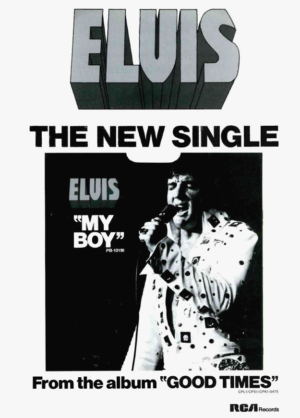
An Elvis record with gray labels
The most valuable record among these export-only pressings is 2458EX, Elvis Presley’s My Boy / Loving Arms. This record has been listed in several process guides with four-figure values has led many Elvis collectors to believe it is a rather rare record. Actually, it may be as common as the other nine records her but there certainly is more of a demand for it! For a while, the fact that the record featured an unattractive gray label made it a standout among Presley platters.
We know now that Indianapolis used the gray labels in late 1974 when they ran out of the soon-to-be-old orange labels and didn’t have the soon-to-be-new light-brown/tan labels. As the Tymes’ records above show, there were at least three export-only records made with these labels.
The most valuable export-only record is 2458EX, whose rarity and value are still being argued among Elvis collectors. I addressed most of the arguments in a separate article; to read that article, click here.
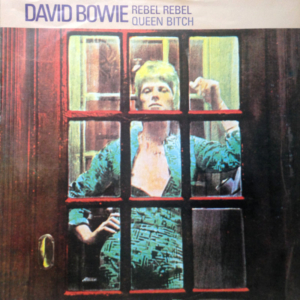
The Avid Record Collector
The ten records listed above were all hits in the UK and so they are not rare. As the peak UK chart positions above make evident most of these records were substantial hits. Consequently, they sold lots of copies in 1974. Subsequently, they are not very hard to find in 2021.
The vast majority of copies available for sale on Discogs at this time are in VG to VG+ condition. Most are available from British sellers and can be had for a pound or two (meaning less than $3). Copies in NM condition of most of the titles can be found for $5-10.
Copies of some of these records may be difficult to find in NM condition. For example, there are 21 copies of 2456EX for sale on Discogs, none with a price above £1.50 (about $2) but none of them are in NM condition!
Two of these records are noticeably more difficult to find and will generally cost more. A copy of APB0-0185EX will probably cost $10-20 in NM condition.
I love coincidences
We watch a lot of movies in our house. Last night, after working on this article, we watched It’s Complicated, a sort of romantic comedy starring Meryl Streep and Alec Baldwin with Steve Martin and Lake Bell. Midway through the story, our protagonists pull their car up to a house where there is a big party going on.
As they head for the house, the opening guitars of David Bowie’s Rebel Rebel emanate from the speakers indoors. There’s less than a minute of the record heard before the scene changes, but it was a nice coincidence, especially as we don’t hear Bowie used as incidental music in most of the movies that we watch.
In 1974, RCA in the US manufactured several records exclusively to be exported to RCA in England for sale in the UK, including three hit singles by David Bowie. Click To Tweet
FEATURED IMAGE: The photo at the top of this page is David Bowie in his Ziggy Stardust phase, posing in what appears to be a public telephone booth in the early ’70s. It was cropped from the advertisement for Rock ‘N’ Roll Suicide that appeared in British magazines in early 1974.
This is one of four articles that address the export-only singles in 1974. The other there are:
• “There Is a Special Export-Only Pressing of My Boy” addresses RCA 2458EX, which was manufactured by RCA in the US exclusively for sale in the UK.
• “Valuable Insert Associated with Export-Only My Boy” addresses a sheet of paper with “Elvis Presley / My Boy” printed on one side that some collectors believe is associated with RCA 2458EX.
• “British Pressings of Elvis Presley’s My Boy Are Common in the UK” addresses the various versions of RCA 2458 manufactured by or for RCA in England at the same time they were importing copies from the US.
Finally, thanks to Paul Alner for alerting me to the Tymes’ export-only records.
Mystically liberal Virgo enjoys long walks alone in the city at night in the rain with an umbrella and a flask of 10-year-old Laphroaig who strives to live by the maxim, “It ain’t what you know that gets you into trouble; it’s what you know that just ain’t so.
I’ve been a puppet, a pauper, a pirate, a poet, a pawn, and a college dropout (twice!). Occupationally, I have been a bartender, jewelry engraver, bouncer, landscape artist, and FEMA crew chief following the Great Flood of ’72 (and that was a job that I should never, ever have left).
I am also the final author of the original O’Sullivan Woodside price guides for record collectors and the original author of the Goldmine price guides for record collectors. As such, I was often referred to as the Price Guide Guru, and—as everyone should know—it behooves one to heed the words of a guru. (Unless, of course, you’re the Beatles.)
